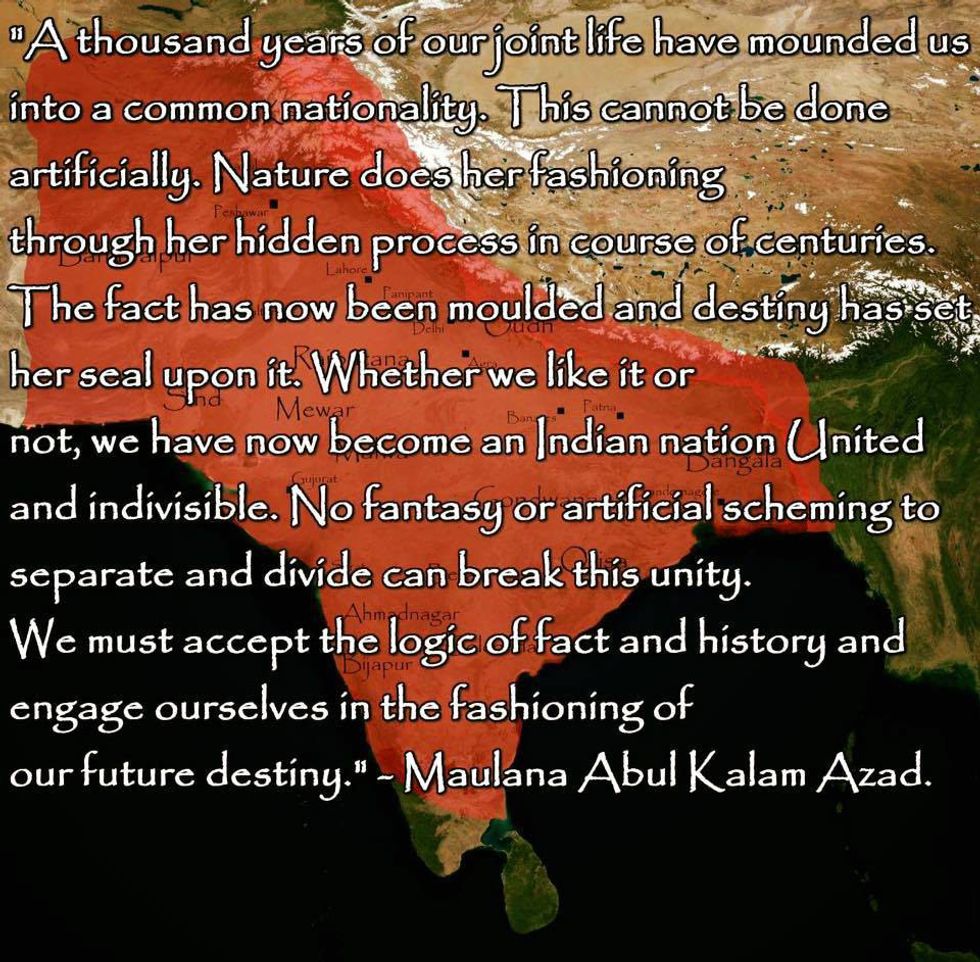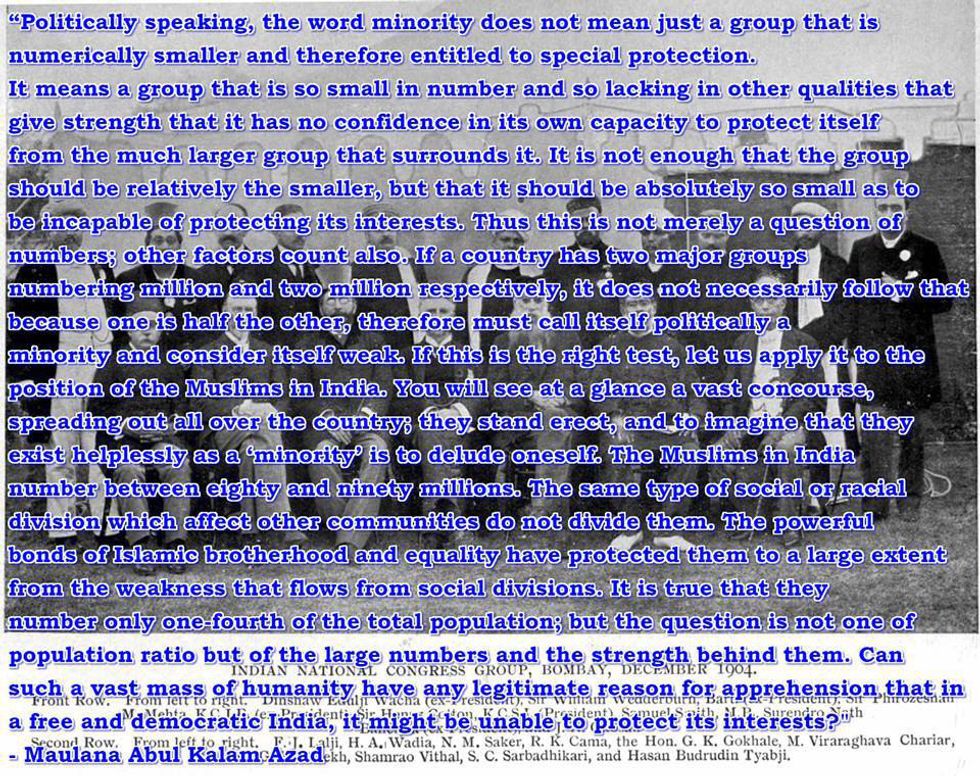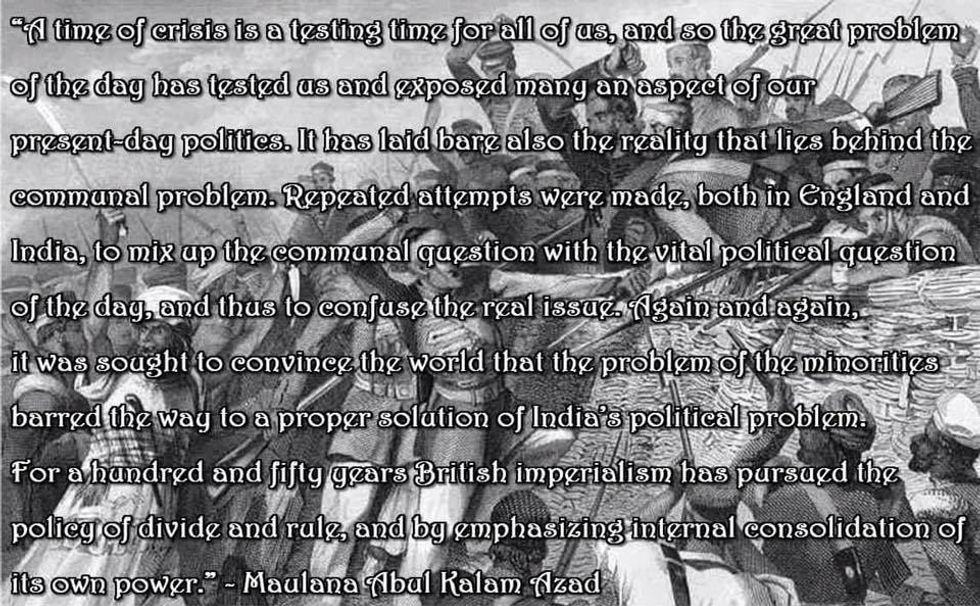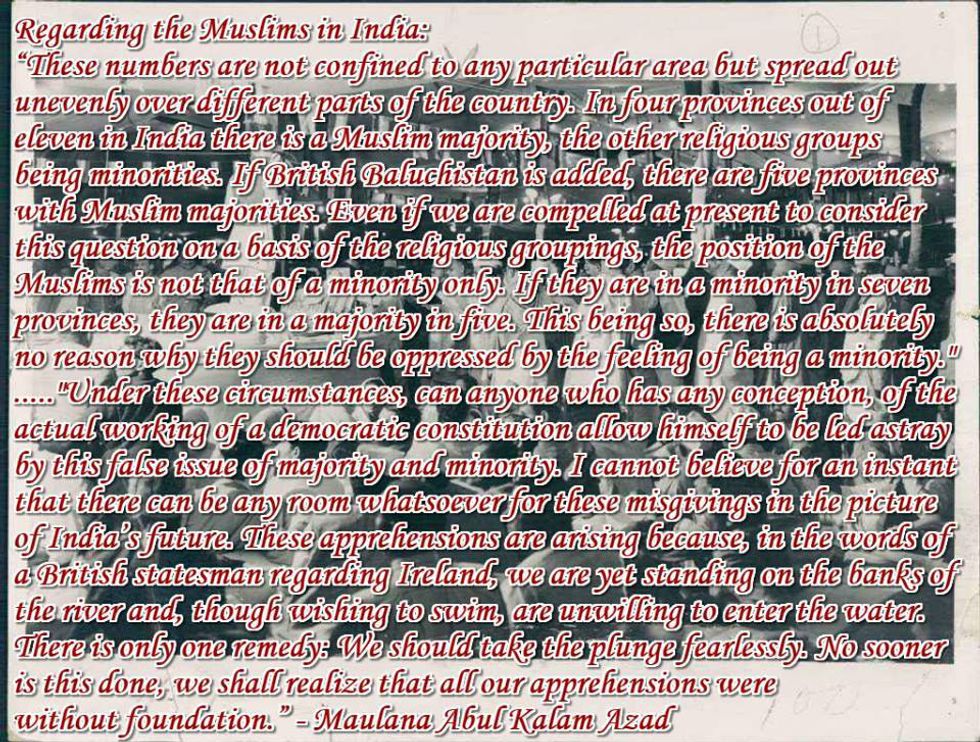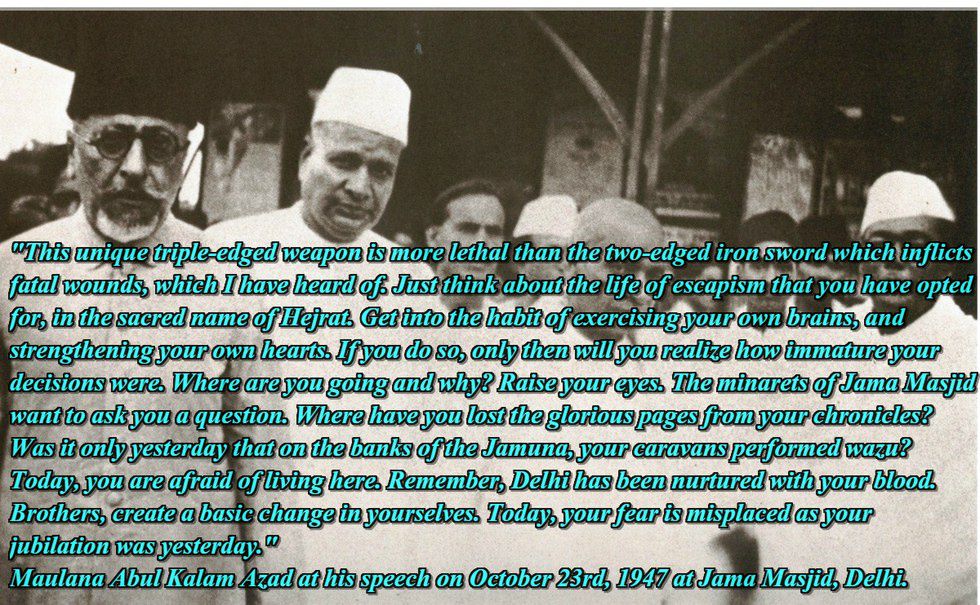Back in August of this year, in honor of independence day for both Pakistan and India, I showed some significant quotes by the distinguished leader Maulana Abul Kalam Azad, who had a great impact in shaping the history of our subcontinent. I felt it important to remember the vision that our leaders held for our people on both sides of the border, the hopes that they cherished for our future. Nowadays, as tensions continue to escalate between Pakistan and India, I find myself reflecting again on Azad’s speeches and writings, fervently wishing for peace and love between our nations. A man who never wanted to see his people divided, he always called for solidarity and harmony between our people. He knew that dividing our people, whether physically or mentally, would only benefit those who wanted to control us, and that it would make us ultimately weaker. So with this hope, I thought it would be a good idea to draw more wisdom from his words. So let us look at some more quotes by Maulana Abul Kalam Azad, and call on our citizens and leaders to cease their bickering and enmity, because if we want any hope of moving forward we must work together and lift each other up.
**Side note: Just like the previous article, all images with quotes were made by me (which definitely took a lot of time and effort!), and this time I also wrote out the text on the quotes in case any of them prove difficult to read on smaller devices.
“A thousand years of our joint life have mounded us into a common nationality. This cannot be done artificially. Nature does her fashioning through her hidden process in course of centuries. The fact has now been moulded and destiny has set her seal upon it. Whether we like it or not, we have now become an Indian nation United and indivisible. No fantasy or artificial scheming to separate and divide can break this unity. We must accept the logic of fact and history and engage ourselves in the fashioning of our future destiny.” - Maulana Abul Kalam Azad.
“Politically speaking, the word minority does not mean just a group that is numerically smaller and therefore entitled to special protection. It means a group that is so small in number and so lacking in other qualities that give strength that it has no confidence in its own capacity to protect itself from the much larger group that surrounds it. It is not enough that the group should be relatively the smaller, but that it should be absolutely so small as to be incapable of protecting its interests. Thus this is not merely a question of numbers; other factors count also. If a country has two major groups numbering million and two million respectively, it does not necessarily follow that because one is half the other, therefore must call itself politically a minority and consider itself weak.” Maulana Abul Kalam Azad at his historic Presidential Address at 53rd Congress Session on March 2nd, 1940 at Amrita Bazar Patrika….“If this is the right test, let us apply it to the position of the Muslims in India. You will see at a glance a vast concourse, spreading out all over the country; they stand erect, and to imagine that they exist helplessly as a ‘minority’ is to delude oneself.”....“The Muslims in India number between eighty and ninety millions. The same type of social or racial division which affect other communities do not divide them. The powerful bonds of Islamic brotherhood and equality have protected them to a large extent from the weakness that flows from social divisions. It is true that they number only one-fourth of the total population; but the question is not one of population ratio but of the large numbers and the strength behind them. Can such a vast mass of humanity have any legitimate reason for apprehension that in a free and democratic India, it might be unable to protect its interests?” - Maulana Abul Kalam Azad.
“A time of crisis is a testing time for all of us, and so the great problem of the day has tested us and exposed many an aspect of our present-day politics. It has laid bare also the reality that lies behind the communal problem. Repeated attempts were made, both in England and India, to mix up the communal question with the vital political question of the day, and thus to confuse the real issue. Again and again, it was sought to convince the world that the problem of the minorities barred the way to a proper solution of India’s political problem. For a hundred and fifty years British imperialism has pursued the policy of divide and rule, and by emphasizing internal consolidation of its own power.” - Maulana Abul Kalam Azad at his historic Presidential Address at 53rd Congress Session on March 2nd, 1940 at Amrita Bazar Patrika.
“If time had permitted, I would have told you in detail how, during the last sixty years, this artificial and untrue picture of India was made, and whose hands traced it. In effect, this was the same result of the policy of divide and rule which took particular shape in the minds of British officialdom in India after the Congress launched the national movement. The object of this was to prepare the Musalmans for use against the new political awakening. In this plan, prominence was given to two points. First: that India was inhabited by two different communities, the Hindus and the Musalmans, and for this reason no demand could be made in the name of a united nation. Second, that numerically the Musalmans were far less than the Hindus, and because of this, the necessary consequence of the establishment of democratic institutions in India would be to establish the rule of the Hindu majority and to jeopardize the existence of the Muslims.” - Maulana Abul Kalam Azad at his historic Presidential Address at 53rd Congress Session on March 2nd, 1940 at Amrita Bazar Patrika.
“Muslim separatism is a house built on the faulty foundations of fear, namely, the apprehension that Muslims in a free and democratic India would be a vulnerable minority and that svaraj (self-rule, the call of the nationalist movement), as the Muslim Leaguers never tired of repeating, would mean ‘Hindu raj’.” - Maulana Abul Kalam Azad.
“These numbers are not confined to any particular area but spread out unevenly over different parts of the country. In four provinces out of eleven in India there is a Muslim majority, the other religious groups being minorities. If British Baluchistan is added, there are five provinces with Muslim majorities. Even if we are compelled at present to consider this question on a basis of the religious groupings, the position of the Muslims is not that of a minority only. If they are in a minority in seven provinces, they are in a majority in five. This being so, there is absolutely no reason why they should be oppressed by the feeling of being a minority.”....“Under these circumstances, can anyone who has any conception, of the actual working of a democratic constitution allow himself to be led astray by this false issue of majority and minority. I cannot believe for an instant that there can be any room whatsoever for these misgivings in the picture of India’s future. These apprehensions are arising because, in the words of a British statesman regarding Ireland, we are yet standing on the banks of the river and, though wishing to swim, are unwilling to enter the water. There is only one remedy: We should take the plunge fearlessly. No sooner is this done, we shall realize that all our apprehensions were without foundation.” - Maulana Abul Kalam Azad at his historic Presidential Address at 53rd Congress Session on March 2nd, 1940 at Amrita Bazar Patrika.
“It was not long ago when I warned you that the two-nation theory was death-knell to a meaningful, dignified life; forsake it. I told you that the pillars upon which you were leaning would inevitably crumble. To all this you turned a deaf ear. You did not realize that, my brothers! I have always attempted to keep politics apart from personalities, thus avoiding those thorny valleys. That is why some of my messages are often couched in allusions. The Partition of India was a fundamental mistake. The manner in which religious differences were incited, inevitably, led to the devastation that we have seen with our own eyes. Unfortunately, we are still seeing it at some places. There is no use recounting the events of the past seven years, nor will it serve any good. Yet, it must be state that the debacle of Indian Muslims is the result of the colossal blunders committed by the Muslim League’s misguided leadership. These consequences however, were no surprise to me; I had anticipated them from the very start.” - Maulana Abul Kalam Azad on his speech on October 23rd, 1947 at Jama Masjid, Delhi.
“This unique triple-edged weapon is more lethal than the two-edged iron sword which inflicts fatal wounds, which I have heard of. Just think about the life of escapism that you have opted for, in the sacred name of Hejrat. Get into the habit of exercising your own brains, and strengthening your own hearts. If you do so, only then will you realize how immature your decisions were. Where are you going and why? Raise your eyes. The minarets of Jama Masjid want to ask you a question. Where have you lost the glorious pages from your chronicles? Was it only yesterday that on the banks of the Jamuna, your caravans performed wazu? Today, you are afraid of living here. Remember, Delhi has been nurtured with your blood. Brothers, create a basic change in yourselves. Today, your fear is misplaced as your jubilation was yesterday.” - Maulana Abul Kalam Azad on his speech on October 23rd, 1947 at Jama Masjid, Delhi.
“Eleven hundred years of common history have enriched India with our common achievements. Our languages, our poetry, our literature, our culture, our art, our dress, our manners and customs, the innumerable happenings of our daily life, everything bears the stamp of our joint endeavor. There is indeed no aspect of our life which has escaped this stamp. Our languages were different, but we grew to use a common language; our manners and customs were dissimilar, but they acted and reacted on each other and thus produced a new synthesis. Our old dress may be seen only in ancient pictures of by-gone days; no one wears it today. This joint wealth is the heritage of our common nationality and we do not want to leave it and go back to the times when this joint life had not begun.” - Maulana Abul Kalam Azad.
“Whatever had to happen has happened. If your hearts have still not changed and your minds still have reservations, it is a different matter. But, if you want a change, then take your cue from history, and cast yourself in the new mould. Having completed a revolutionary phase, there still remains a few blank pages in the history of India. You can make ourselves worthy of filling those pages, provided you are willing.” - Maulana Abul Kalam Azad on his speech on October 23rd, 1947 at Jama Masjid, Delhi.
Needless to say, things have changed since independence. But Azad’s words have just as much significance today as they did over 60 years ago, because our goals and aspirations remain the same: We want what is best for our people. We want to expel the antagonism that has seeped into us like a poison, to promote peace and harmony. This will not happen overnight, but we will achieve it with mutual understanding and friendship. Let’s work together to ensure a brighter future for India and Pakistan!

